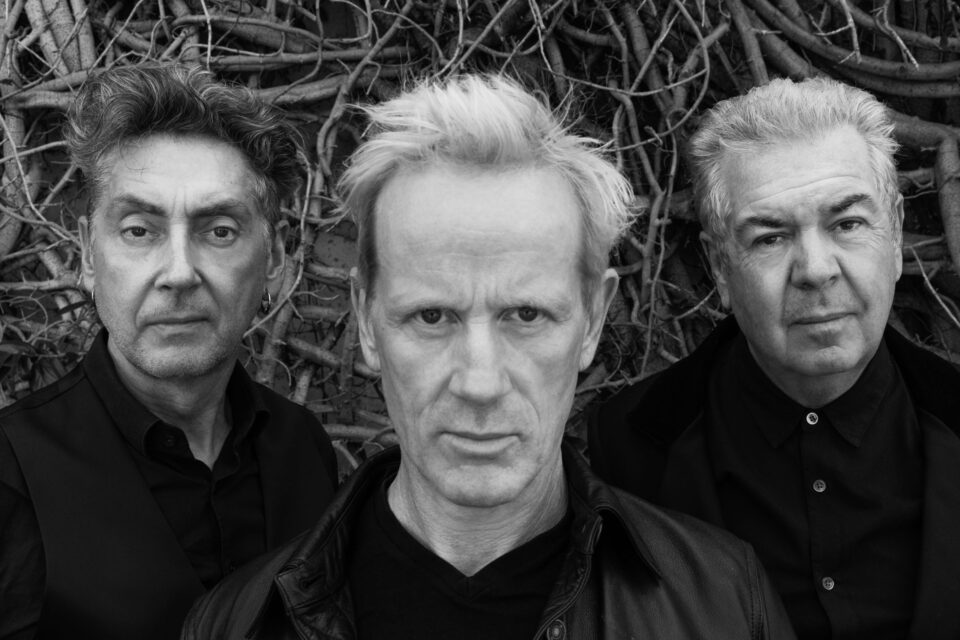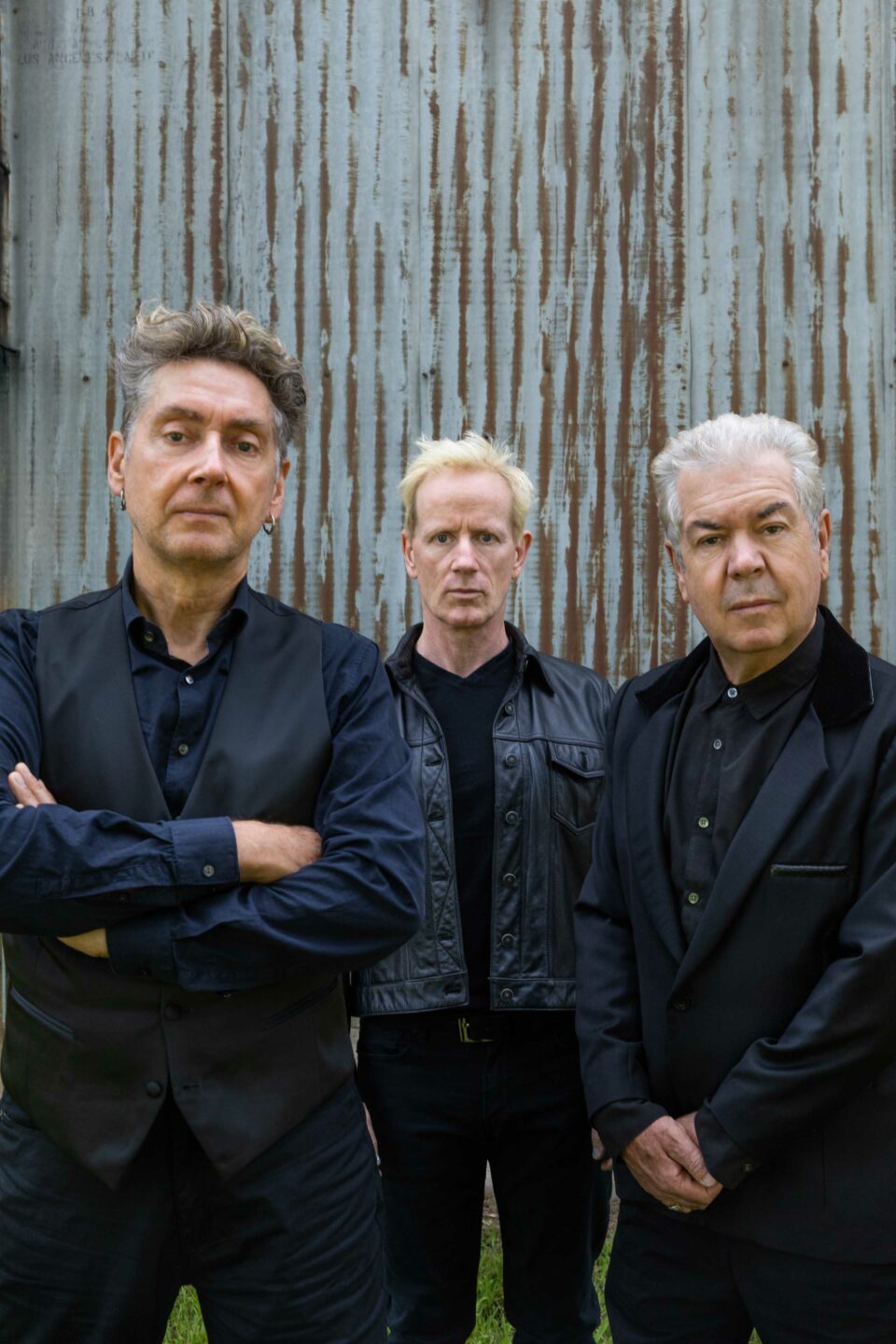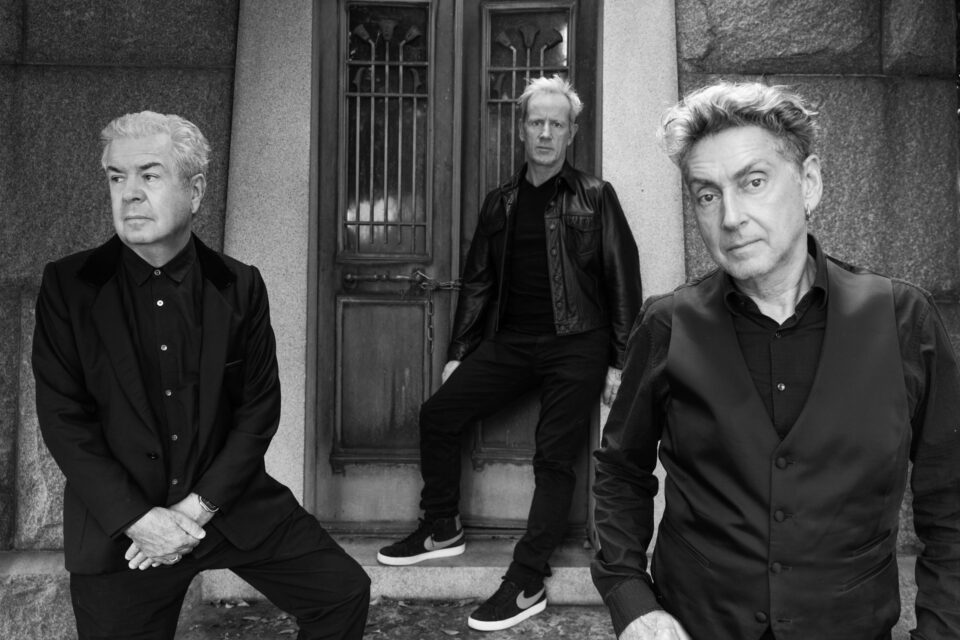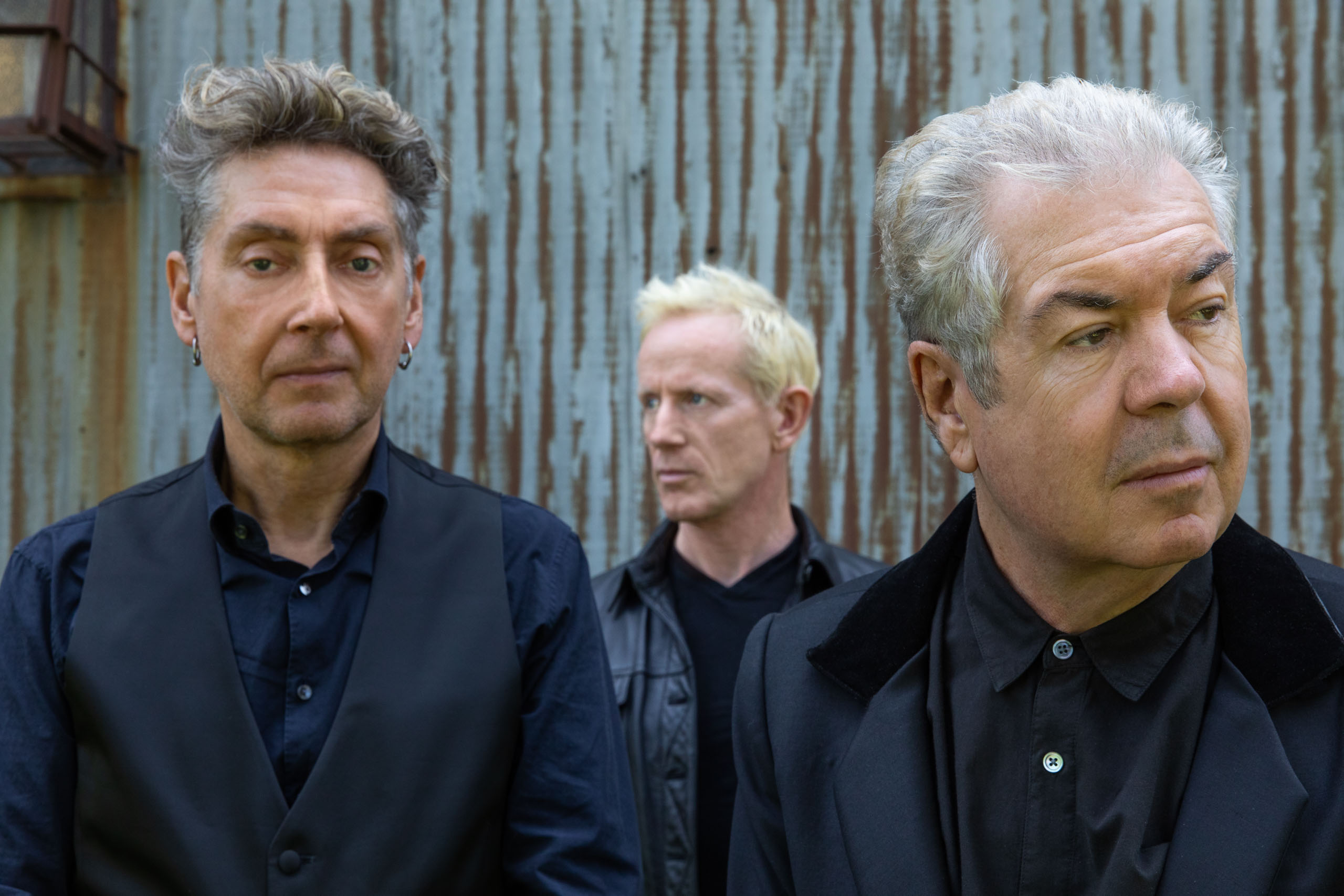Lol Tolhurst and Budgie will be taking over FLOOD FM for our “Hacked” series airing from October 30 through November 3 at 10 a.m., 1 p.m., 5p.m., and 10 p.m. PT for a guest DJ takeover featuring hand-picked tunes and commentary. Mark your calendar and tune in here.
From LA, Lol Tolhurst joins the Zoom video chat first. Moments later, Budgie jumps on from a small village in the South of France, and they immediately begin laughing and chatting with the easy camaraderie of a close friendship forged through similar backgrounds. Both rose to fame in the early 1980s: Tolhurst as the drummer and keyboardist for The Cure, Budgie as the drummer for Siouxsie & the Banshees. Now they’ve joined forces in a new band, along with producer/multi-instrumentalist Jacknife Lee, with their debut album Los Angeles arriving imminently.
Fans may be surprised to find that the 13 tracks on Los Angeles don’t really bear close resemblance to either Tolhurst or Budgie’s previous musical output. Instead, there’s a certain beautiful unpredictability to this electronic-based, rhythmically intricate material. This esoteric approach was, Tolhurst says, entirely deliberate: “We’re very excited to let people hear it because it’s way different than what anybody’s going to expect,” he says. “We stretched ourselves a lot on this. We did things that neither of us thought we could do. We’re a good support team. We encouraged each other to do those things. And Jacknife is very encouraging, as well. He’s like, ‘OK, let’s find out what’s going to serve the track.’ That was a good way to work.”
Budgie agrees: “What’s been the most illuminating and invigorating about it all is the way we’ve been able to check our egos at the door and enter into it together, completely open to other people’s direction.”

This is, Budgie adds, a departure from the way he’s seen things usually go for musicians. “One little theory I keep putting out there is that even your own band might [only] expect you to do the role you normally do. I’ve had a lot of experience of that, having played with the same band for 17 years: suddenly I’m just the drummer with no input into the creative decision-making. So I’ve got long days of doing not a lot.” But he adds that with this new collaborative project, “In many ways, we’re allowing people the space to be what they might be if they were allowed that space in their own normal way.”
Of course, there was a chance that things wouldn’t work so well—after all, even bandmates who are friends don’t always see eye to eye when it comes to working together. “We’ve both been in bands where that dynamic comes into play,” Tolhurst says. He cites his own experience as an example: “I’ve known Robert [Smith, The Cure frontman] since I was five years old, which is an awful long time now. But there’s some frictional points, I talk about in my new book,” he says, referencing Goth: A History, which he just published last month. “But that doesn’t seem to be an impediment to me and Budgie working together, creatively, because we’ve been through all that other stuff. We’re pretty much on the same route together, and we reinforce each other rather than take away.”
“What’s been the most illuminating and invigorating about it all is the way we’ve been able to check our egos at the door and enter into it together, completely open to other people’s direction.” — Budgie

When Tolhurst suggested that they work on a music project together, Budgie immediately agreed. But things didn’t seem promising at first: “Before we made this album, we made a whole ’nother album at [Mötley Crüe drummer] Tommy Lee’s house, with another person that was in the band beforehand—and it kind of sounded like you would expect us to sound like, and we didn’t really like that,” Tolhurst says. “We were like, ‘Yeah, no, that’s not going to work.’”
So they scrapped that album and started over again with this no-restrictions/no-expectations approach instead. “We got ourselves a little house up the coast, and what a great bonding session we had,” Budgie says. “Jacknife has a bunch of synthesizers that we just dream of—things I’d never seen; I’ve just read about them. And then Lol’s a huge synth man. There was half a drum kit. Sort of bits and bobs. Lol was coming up with a lot of ambient loops and stuff, so we’d just sit there and listen to that for a while.”
This time, they were happy with the results. But then the COVID pandemic hit, disrupting their plans for completing the album. “We were like, ‘Well, what do we do with all this stuff now?’” Tolhurst recalls. He says they toyed with the idea that maybe they’d simply make it an instrumental album, then decided to share it with some of their musician friends and see what they might be able to contribute. In the end, Los Angeles includes guest appearances by Bobby Gillespie of Primal Scream, U2’s The Edge, James Murphy of LCD Soundsystem, Isaac Brock of Modest Mouse, songwriter Lonnie Holley, harpist Mary Lattimore, and more. “We had a general idea of what we wanted it to be about, and we gave them freedom to interpret it,” Tolhurst says. “We didn’t try and steer the ship, we didn’t go, ‘No, it’s going to be this way!’ We were like, ‘Let’s see what happens.’ Mostly, it came back brilliantly.”
As the files started to come back to them, they were immediately delighted at the unexpected way their collaborators were approaching the material. Jacknife Lee would take these submissions and move things around, shaping the music to support whatever direction the vocal or instrumentation was suggesting it should go. “It was a journey of discovery,” Budgie says. Despite this freeform approach, a theme emerged that bound all the tracks together: it was Los Angeles, the city that’s had an outsized impact on their lives. It seemed only fitting, then, that Los Angeles should become the album title.

“I’ve lived here 30 years—the longest I’ve lived anywhere my whole life,” Tolhurst says of LA. “To me, it’s home. I came here when I left The Cure and everything in my life was disintegrating. I came here and I put myself back together again with the help of everybody here. And I found love, and I found acceptance—complete reinvention of who I was as a person. And for that, I’m very grateful. So to me, it was very obvious when we finally finished the album and everybody was talking about it, that that’s what the album should be called.”
Budgie immediately agrees: “Los Angeles, to me, also was a place of recovery and redemption,” he says. He’d retreated there in the mid-’00s, when both his personal and professional lives were at a low ebb after his marriage to Siouxsie Sioux—and their musical partnership—had dissolved. “Everything had fallen to pieces and I kind of sought out the same support. My friends were mostly in Los Angeles, so that’s where I headed. And people came out of nowhere and helped me: ‘Yeah, you can sleep on our couch.’ It touched me in a very deep and positive way.”
“I came [to LA] when I left The Cure and everything in my life was disintegrating... And I found love, and I found acceptance—complete reinvention of who I was as a person.” — Lol Tolhurst
They both found their way out of those dark times, but they haven’t forgotten the lessons they’ve learned along the way—and, Tolhurst says, this project is now the beneficiary of all that hard-earned experience and wisdom. “I’ve realized that with most of [the creation process], you’re not really in charge, you’re not really doing it; it’s coming through you.” Tolhurst says. “The trick is to recognize that moment and just go, ‘OK, let that come through,’ rather than impede it with all of your ego and other stuff. It doesn’t mean that everything you do is going to be perfect. But it means that you stand a lot better chance of capturing stuff when it could be really good.” FL







